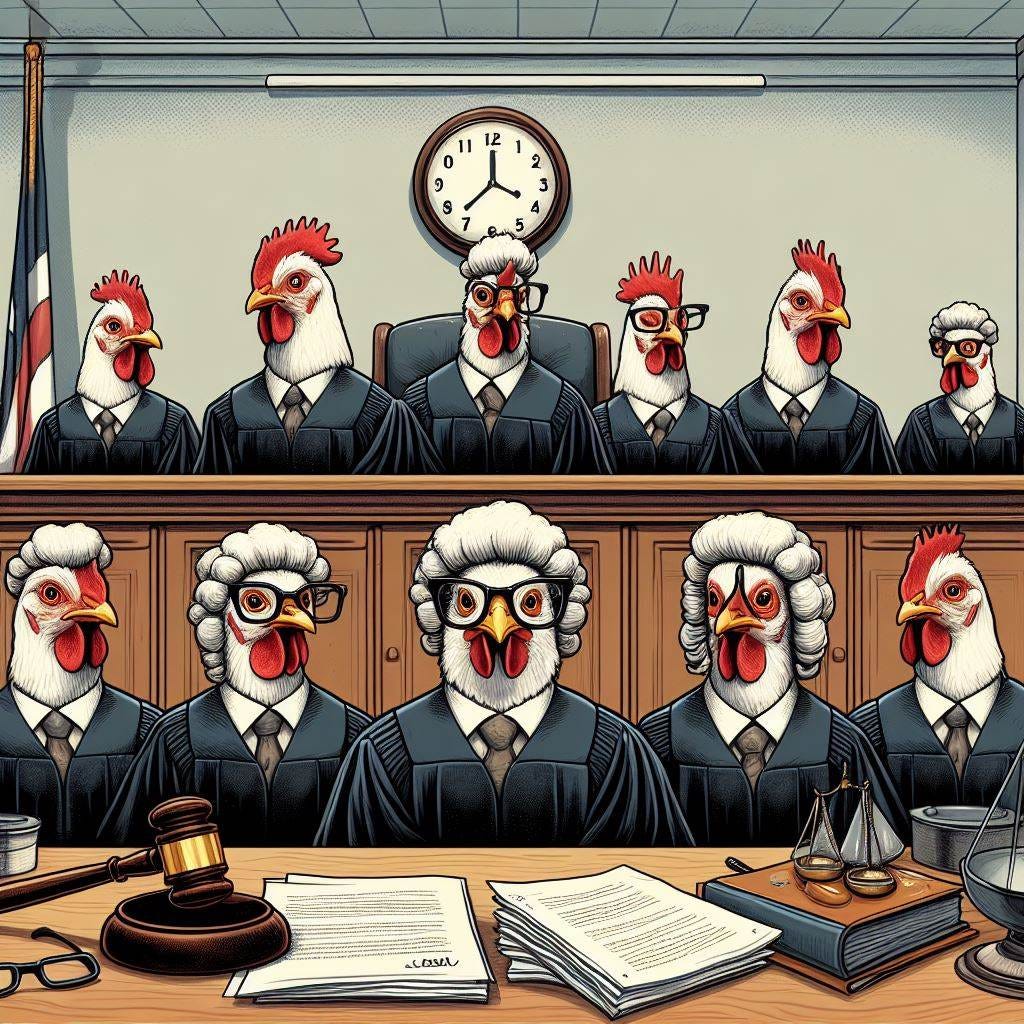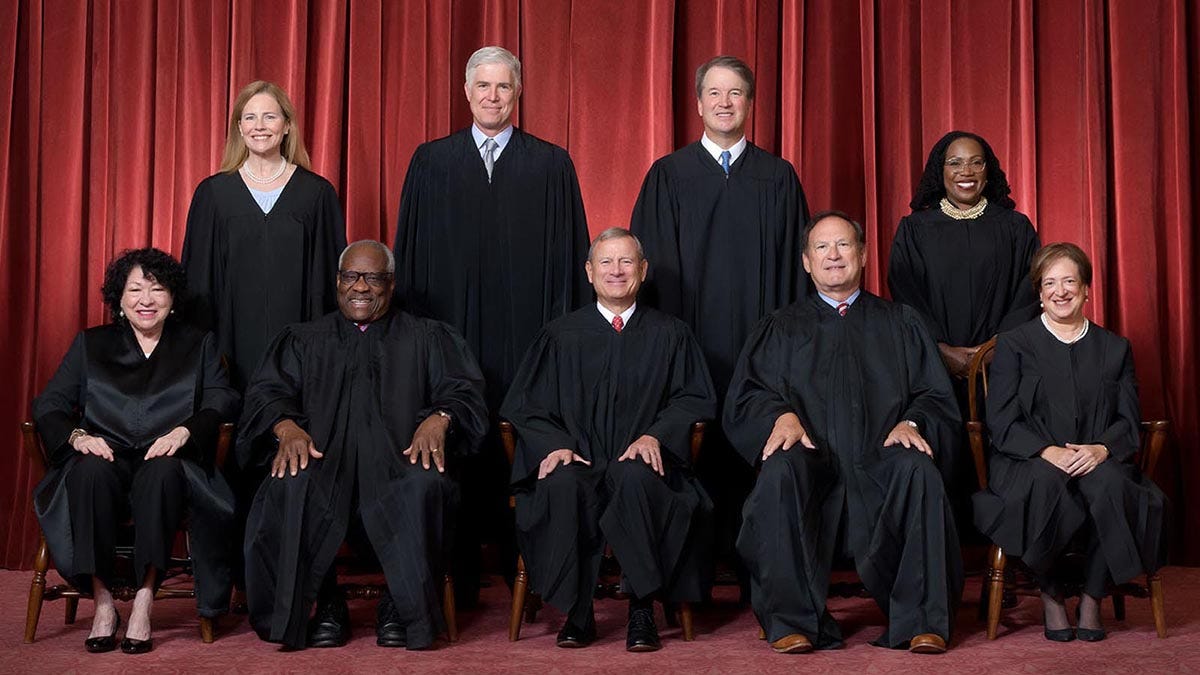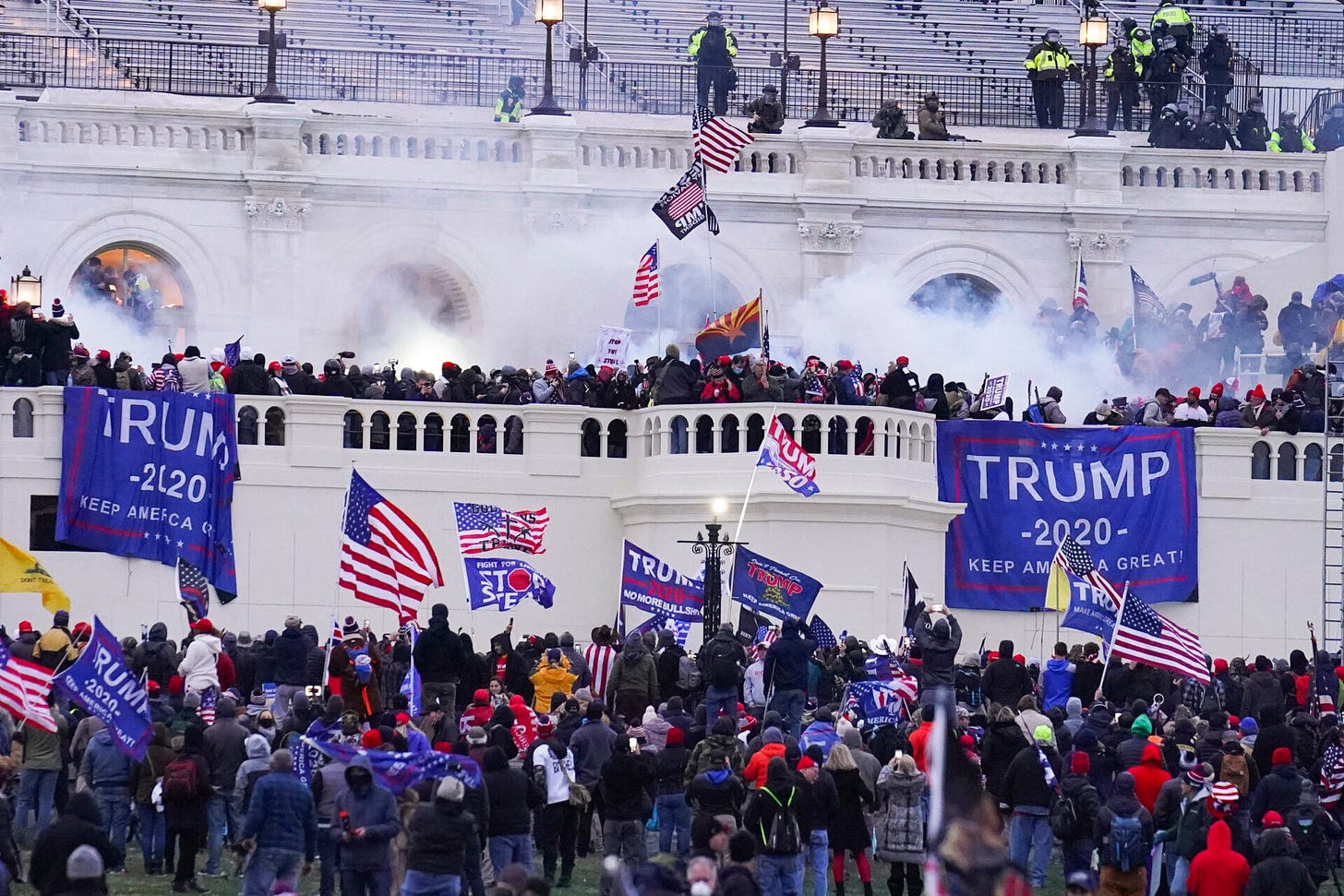U.S. Supreme Court Chickens Out
In December, the Colorado Supreme Court ruled that Donald Trump is ineligible for the Presidency and therefore should not appear on the Republican primary ballot in Colorado. As discussed previously, this decision was correct. But Trump appealed to the USSC, which has just overruled Colorado. Let’s look at why they did this and why it was wrong.
1. Background
The 14th Amendment (“14A”) to the U.S. Constitution, sec. 3, says that anyone who swore an oath to uphold the Constitution, then engaged in insurrection, is ineligible to hold any office under the United States.
Colorado law says that the secretary of state should only list eligible candidates on the primary ballots. Some voters sued to stop the secretary of state from listing Donald Trump, because he is an insurrectionist. The Colorado district court first ruled that Trump could appear on the ballot. They agreed that Trump was an insurrectionist, but they claimed, bizarrely, that the Presidency isn’t an “office under the United States”.
The Colorado Supreme Court then reversed the district court, in a 4-3 decision. The majority said that Trump was ineligible and shouldn’t appear on the ballot. The minority did not dispute that Trump was an insurrectionist, nor that insurrectionists are ineligible for the Presidency. But they thought that Trump would have to be convicted for insurrection in a trial in order to be disqualified.
(Trump’s name still in fact appeared on the primary ballot because the Colorado court stayed their order, pending the decision by the USSC.)
The USSC then took up the case (Trump v. Anderson). They did not dispute that Trump was an insurrectionist. They also did not dispute that insurrectionists are ineligible for the Presidency. So overall, they do not at all dispute that Trump is Constitutionally ineligible to serve as President. Instead, they merely claimed that Colorado doesn’t have the authority to enforce the 14A; therefore, the Colorado decision was reversed.
The majority opinion says that only Congress can enforce the 14th Amendment, meaning that Congress had to pass some law saying how insurrectionists would be disqualified. A minority of the court (Kagan, Jackson, Sotomayor, Barrett) agreed that states couldn’t enforce the 14A, but they disagreed with the claim that only Congress could do it; they would have left open the possibility of federal courts enforcing it.
2. The Court’s Pathetic Arguments
Here are some of the lame points made by the USSC:
1. Sec. 5 of the 14th Amendment says, “The Congress shall have power to enforce, by appropriate legislation, the provisions of this article.”
Comment: This doesn’t preclude that states can also enforce it.
2. Shortly after the 14A was ratified, a senator complained that some insurrectionists were holding office anyway, and he called for legislation to stop this.
Comment: This doesn’t suggest even that that Senator would have opposed states’ enforcing the 14A, let alone that anyone else would have done so.
3. “Because federal officers ‘owe their existence and functions to the united voice of the whole, not of a portion, of the people,’ powers over their election and qualifications must be specifically ‘delegated to, rather than reserved by, the States.’” I.e., the Constitution would have to have specifically said that states had this power, else it should be assumed that they don’t.
Comment: This might make sense if Colorado were claiming the right to unilaterally decide what the qualifications are for being President. But they’re not claiming that. Colorado is only claiming that Colorado election officials should not violate the conditions stated in the U.S. Constitution by counting votes for a candidate who is Constitutionally disqualified. That isn’t refuted by the fact that federal office holders are elected by the whole country, nor by vague rhetoric about “the voice of the people”.
4. No one thinks that states could remove sitting federal officeholders who violate the 14A.
Comment: That’s probably because an individual state would have no mechanism for doing that, as there is no existing process in which they have to do anything to make sitting federal officials remain in office. By contrast, when it comes to candidates for office, the state governments are specifically charged with running the elections in their states (this is in the U.S. Constitution). So the states cannot simply remain passive with respect to the elections; they have to decide who goes on the ballot – which forces them to decide who is eligible.
This makes it highly misleading that the USSC framed the issue in terms of whether state governments have the “authority” to “enforce” the 14A. That’s not the question. The question is whether state governments should obey the 14A in the way they run elections. The USSC’s opinion amounts to the claim that states lack the “authority” to follow the Constitution.
5. The Constitution authorizes states to run elections. (Art. I, §4, cl. 1; Art. II, §1, cl. 2.1) “But there is little reason to think that these Clauses implicitly authorize the States to enforce Section 3 against federal officeholders and candidates.”
Comment: Um, yes, there is a rather obvious reason to think that. If I tell you to do X, then I list some constraints on how X should be done, then rather obviously, I’m “authorizing” you to do X in accordance with those constraints. I have no idea why the Court is claiming that there’s “little reason” to believe this – except that (as explained above) they’re getting confused about what the issue is.
6. The 14A allows Congress, by a 2/3 supermajority, to vote to permit a given insurrectionist to hold office. Sometimes, Congress did this after an election. But if states could remove insurrectionists from the ballot before the election, that would place a “burden” on Congress to decide before the election on whether they wanted an insurrectionist to be able to hold office. But states shouldn’t be able to put burdens on Congress.
Comment: I find this super-dumb. The burden in question is trivial, and the alternative is that the Constitution is going to be blatantly violated. No one thinks that Congress is in fact going to make that 2/3 majority vote, after the election, to allow Trump to take office. He’s just going to take office in violation of the 14A. This made-up principle about “burdening Congress” can’t take precedence over the plain meaning of the 14A.
7. There’s no tradition of states enforcing the 14A against federal officeholders.
Comment: It’s easy to think of reasons why this hasn’t happened other than that it would be unconstitutional.
8. If states could disqualify candidates, different states might make different decisions, which would cause “chaos”.
Comment: This is a political argument, not a legal argument. There is no legal rationale for allowing insurrectionists to be elected in order to avoid “chaos”. Moreover, the USSC obviously could have avoided that chaos by ruling on Trump’s eligibility itself, which is obviously what they were called upon to do.
9. The overall thrust of the 14A was to limit states’ rights and expand federal power. Therefore, it wouldn’t make sense for the 14A to give states a new power to control eligibility for federal office. (majority opinion, 8; minority opinion, 3)
Comment: Again, this presupposes (bizarrely) that the issue in the case was Colorado’s making up new eligibility conditions. That wasn’t the issue. The Colorado court’s ruling did not interpret the 14A as giving Colorado a new power; it interpreted the 14A as imposing a new restriction on the states: that they can’t cast their electoral votes for an insurrectionist.
3. The Minority’s Disagreement
The minority’s disagreement: They complained that the Court said too much. They thought that the Court should have merely said “Colorado can’t decide this”, then refused to say any more.
Of all the complaints you could raise about the majority opinion, this is among the worst. It’s as though the entire Court agrees in not giving a crap about (a) whether the Constitution gets followed or not, and (b) whether the key questions that the country needs decided get decided.
The issue that the country needed decided wasn’t a technical legal question about state authority. The issue that the country needed decided was whether Trump is eligible to serve as President. That’s completely obvious to everyone other than the nine Supreme Chickens. Yet the USSC somehow managed to ignore the issue, effectively allowing Trump to serve but without considering whether he is actually eligible under the Constitution. They thus effectively nullified the 14A.
The minority cited a “vital principle” that the Court should never decide anything that it doesn’t absolutely have to decide in order to dispose of the case before them. This principle itself has no basis and is obviously anti-social: its main function is to prevent the Court from being helpful. The Court also violates this alleged principle all the time.
4. More on Why the Court Was Wrong
1. In the USSC decision, the only problem noted with the Colorado court’s decision was that it was done by Colorado instead of at the federal level. They didn’t dispute that the decision was substantively correct – i.e., that Trump was an insurrectionist who is barred from the Presidency according to the 14A. They just claimed that it shouldn’t be a state that makes that determination. In saying this, they forgot that they themselves had the case in front of them, and that they themselves were a federal, not a state court. Though the majority opinion claimed that only Congress could enforce the 14A, they didn’t explain why they themselves couldn’t enforce it.
2. Most of their arguments would apply to any other eligibility requirement. If a 20-year old, Canadian cat who has already served 2 terms as President runs for President again, the USSC’s arguments would imply that the states have to list that cat on their ballots and allow their electoral votes to go to the cat, because otherwise they would be exerting control over eligibility for federal offices. And since Congress hasn’t passed any statutes prohibiting the cat from being elected, the cat could win and serve as President.
3. No one would make a similar claim about other Constitutional provisions. E.g., no one would claim that the Colorado Supreme Court couldn’t enforce the First Amendment against another Colorado government agency, merely because the 1A is federal. In this case, the Colorado Supreme Court was enforcing the 14A against the Colorado secretary of state.
Again, the Colorado court wasn’t restricting the actions of anyone outside of Colorado. It was just requiring that Colorado election officials should act in accordance with the federal, Constitutional requirements on eligibility. It’s ridiculous to claim that they can’t do that, that they have to allow their electoral votes to go to someone who is Constitutionally prohibited from serving, just because it’s a federal office.
5. The Politics
Let’s set aside the legal rationalizations. This was a political decision and a failure of nerve: The Court was afraid to touch the real issue because they – like half of the government – are afraid of Donald Trump’s supporters. They know that Trump is ineligible, but if they said that, the Trumpers would go ape-shit, start riots across the country, and start threatening the lives of the Justices’ families. More generally, it would be politically divisive if Trump were eliminated by the courts rather than at the ballot-box. (Many other people think this, so it would be unsurprising that the USSC thinks it.)
Amy Coney Barrett wrote:
“The Court has settled a politically charged issue in the volatile season of a Presidential election. Particularly in this circumstance, writings on the Court should turn the national temperature down, not up. For present purposes, our differences are far less important than our unanimity: All nine Justices agree on the outcome of this case. That is the message Americans should take home.”
This makes clear that she was worried about political unrest if the Court should say the wrong thing. It also suggests that she was self-censoring, and thought other justices should self-censor, to create an appearance of unity on the Court. (She may not realize that readers like me could figure that out.)
In addition, the conservative majority may actually be hoping for another Trump term, to lock in conservative control of the Court for another couple of generations.
So here is what I think may have happened: The 9 justices, concerned about public reaction to their decision, colluded to create the appearance of unity. The Republican majority was going to get their way re: overruling Colorado no matter what. Roberts convinced the Democratic justices that it would be bad for the credibility of the Court to have a party-line vote, and so, since they were going to lose anyway, the Democrats should just cast their votes with the majority, so they could all pretend that it wasn’t a partisan decision.
I don’t have any proof of that; that’s just a guess to explain how this pathetically-reasoned decision could possibly be 9-0.
Was the Court right in its political calculations? I believe not. First, I think they will fail in their goal of preserving the Court’s credibility. People will notice that they are making partisan political decisions.
Second, however divisive it would be to exclude Trump through the courts, things are going to be even worse if he gets elected, which now looks about 50% likely. Given what he did last time, there is no telling what crises he might create for American democracy during his second term. He is the world champion of sowing division, suborning criminal behavior, and violating norms. There is no guarantee that he won’t start a second civil war.
Third, it is hard to estimate the harm done by setting the precedent that you can get away with anything as long as you have enough dangerous supporters and you’re happy to incite them to violence.




